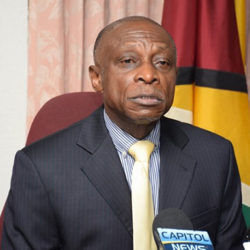The Ministry of Foreign Affairs on Tuesday defended Guyana’s vote against a UN resolution on funding for a gay rights envoy arguing that the mandate of the office lacked specificity among other reasons.
The statement from the ministry follows a report in Tuesday’s edition of Stabroek News on the vote which was raised at an end-of-year press conference held on Thursday by Minister of Foreign Affairs, Carl Greenidge. The report on Tuesday had pointed out that Greenidge provided no details for the vote.

Adverting to the resolution from the UN Human Rights Council on June 30, 2016 for an Independent Expert on protection against violence and discrimination based on sexual orientation and gender identity, the Ministry on Tuesday noted that the African group of states presented a counter resolution calling for the work of the independent expert to be halted “in order to allow time for further consultations to determine the legal basis upon which the mandate of the Expert is defined”.
The ministry said that in its reasoning to vote against funding for the Expert as outlined in the resolution, “Guyana noted that the mandate of the Independent Expert lacked the necessary specificity to be effectively undertaken. Furthermore, it felt that the African Group draft resolution sought to give Member States, particularly those without representation in Geneva, an opportunity to examine the Council’s resolution and determine the legal basis on which the special procedure to be established for implementation of the mandate of the Independent Expert would be defined. A position which Guyana supported based on its own situation”.
Further, the ministry said “In the absence of pronouncement supported by public opinion, Guyana has consistently refrained from taking positive action on sexual orientation matters in the international arena”.
The latter statement will be seen as an acceptance by the ministry that public opinion will determine Guyana’s outlook on such issues as sexual orientation.
The ministry also said “In addition, presently, there is no international legal instrument that defines discrimination based on sexual orientation or discrimination based on gender identity. These concepts are construed differently in different States or countries”.
This statement will likely trigger the ire of gay rights groups. Observers point out that while there is no explicit recognition of sexual orientation as a prohibited ground for discrimination, international human rights instruments protect the rights of lesbian, gay, bisexual and transgendered persons. Further, in 1992, the UN Human Rights Committee had said that the reference to “sex” in articles 2 and 26 of the International Covenant on Civil and Political Rights is to be read as including sexual orientation.
The ministry on Tuesday said that Guyana also determined that the mandate of the Independent Expert was not clearly defined as required by Human Rights Council resolution 5/1, which says that new mandates of the Council should be “as clear and specific as possible so as to avoid ambiguity”.
The ministry repeated the statement made by Greenidge at Thursday’s press conference that the December 19th vote against the resolution did not portend a similar vote or position should future related issues arise in United Nations forums.
Speaking at Thursday’s press conference on the subject, Greenidge had said: “You can have a broad agreement on something and find that the wording of a specific resolution or the way it has evolved, the option was not whether or not to fund this particular expert. It was an approach to the issue.”
He said it was felt that “the issue could have been dealt with differently” and asked the media not to take it as an “indication of hostility to a position of this group in particular.”
Reuters reported that on December 19, African states narrowly failed for a second time to halt the work of the first U.N. independent investigator appointed to help protect gay and transgender people worldwide from violence and discrimination.
The attempt, the report said was voted down in the U.N. General Assembly 84 to 77 with 16 abstentions, a month after African states made a similar unsuccessful move in the General Assembly’s third committee, which covers human rights.
The 47-member U.N. Human Rights Council, based in Geneva, Switzerland created the position in June and in September appointed Vitit Muntarbhorn of Thailand, who has a three-year mandate to investigate abuses against lesbian, gay, bisexual, transgender and intersex (LGBTI) people.
Gay sex is a crime in at least 73 countries, including Guyana.
Reacting to the UN vote, U.S. Ambassador to the United Nations Samantha Power said the bid by the African states was “rooted in a real disagreement over whether people of a certain sexual orientation and gender identity are in fact entitled to equal rights.”
“And it is being driven by a group of U.N. member states that believe it is acceptable to treat people differently because of who they are or who they love,” she told the General Assembly.
Reuters added that Russia, several African countries and Egypt, speaking on behalf of the 57-member Organisation of Islamic Cooperation, said last month they would not recognize the mandate of the gay rights investigator and would not cooperate with Muntarbhorn
Russia also prevented the United Nations Security Council from thanking outgoing Secretary-General Ban Ki-moon specifically for promoting gay rights during his decade in office, diplomats said.
In February, Reuters said that the African Group, the Organisation of Islamic Cooperation and the 25-member “Group of Friends of the Family,” led by Egypt, Belarus and Qatar, protested the launch of six U.N. stamps promoting LGBT equality.




